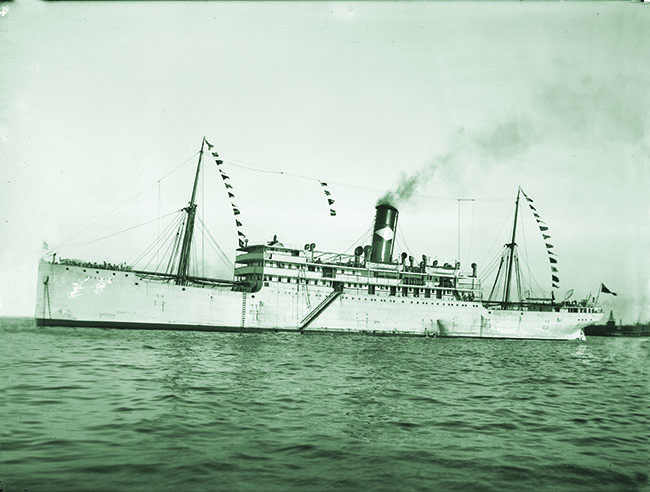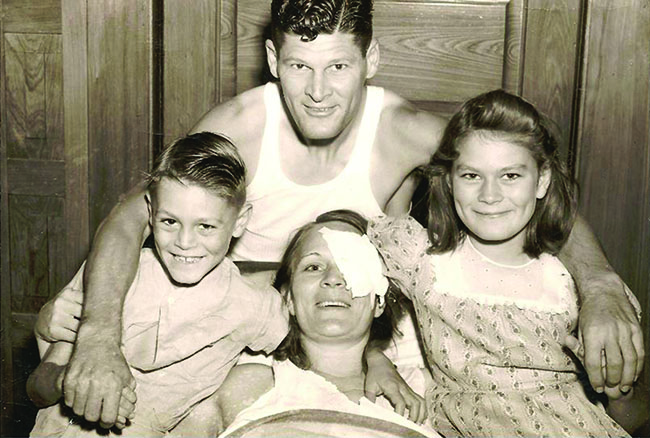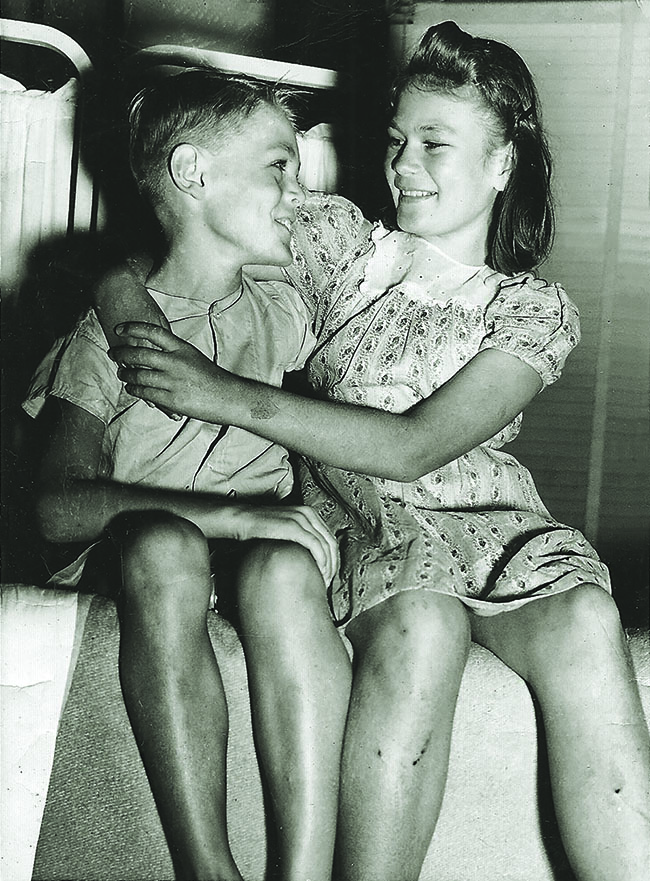
RAYMOND DOWNS JR. OF QUINCY, MASSACHUSETTS, was eight years old when, on May 19, 1942, a U-boat torpedoed his ship in the Gulf of Mexico, about 40 miles southwest of New Orleans. He and his father Raymond Sr., mother Ina, and sister Lucille were aboard the freighter SS Heredia, heading home from South America, where Ray Sr. had worked for the United Fruit Company. All four survived, but 36 others perished. Today, Ray, 84, still works every day in the insurance business, as he has for nearly 60 years. With a soft South Texan drawl and friendly manner, he easily recalls that terrible night—chronicled in the 2016 book So Close to Home: A True Story of an American Family’s Fight for Survival during World War II by Michael J. Tougias and Alison O’Leary—though he occasionally chokes up when he thinks about what could have happened.
How did you end up on a freighter in the Gulf of Mexico?
We were in Costa Rica when the war broke out. My dad wanted to get back to the States and join the Marines. We went to Colombia and left on a big gray freighter that was hauling bananas and coffee back to the States. All of our stuff was on there: car, furniture, clothes, and about $20,000 in cash. That was a lot of money back then. My dad had to sign a waiver that if anything happened, United Fruit Company was not liable. We had two staterooms under the main deck. My sister and I had bunk beds. I had the top bunk because I was the youngest. My sister was 11 and she had the bottom bunk.
When did the U-boat strike?
It was on the last night of a seven-day trip. I asked my dad if he could sleep in my cabin and let Lucille sleep with mom. He said sure and got in the bottom bunk. So I went to sleep and I guess I was dreaming. I heard a commotion or something and thought—and I never will forget this—“Gee, we must be bumping against the dock in New Orleans.” Then there was a second, louder explosion and I opened my eyes. It was about 2 a.m. I looked up and my dad is standing right in my face. I looked down on the floor and he is standing in water. He says, “Put on your life jacket and tie it tight. You stay right here. I’m gonna get your mother and your sister.”
And then?
We go out of our stateroom and we are walking in water. As we came out, there was a guy there with two flashlights saying, “Don’t come down here. There’s no ship down here.” The water was gushing all around him. We went on the main deck; the ship lurched and water washed us all in different directions. I was underwater then, along with most of the ship. I swam over to a steel ladder and had a hard time climbing it because of the angle, but I finally got up. Another passenger, George Conyea, was right behind me. I was on the ship’s top deck; the ship’s captain, Erwin Colburn, was already there. I couldn’t understand why it was so bright. By this time, the U-boat had surfaced, but I couldn’t see it because the Germans were shining a searchlight. Our ship went down in ei
ght and a half minutes, so this is all happening very fast. There is water swirling all over, with the top deck just a little above it, and I see someone swimming toward us. It’s my dad!

How did you get off the ship?
We found a life raft—just a four-by-four balsa wood frame wrapped in canvas. The captain says, “I can’t swim.” My dad looks at him and says, “Boy, you’re gonna learn really quick.” So my dad put me on the raft, pushed it off the side, and the other three jumped into the water. My dad had me lay down because he thought the sub was going to shoot us. Well, I about drowned. So we paddled like crazy.
What happened in the water?
My dad was bleeding from his legs, so the captain and Conyea tied up his wounds. He was really worried about my mom and sister but tried not to show it. One time, he thought he heard my mom and tried to swim toward the sound, but the captain stopped him. He said it was too dangerous in the dark.
In the afternoon, we had sharks—about six, eight feet long. We had a couple of them that would dive under the raft where our legs were hanging in the water. The sharks would turn over and show their teeth. They just kept circling us. All of a sudden, a school of porpoises came in. The sharks left and the porpoises circled us. Eventually, they left, too.
When did help arrive?
We had been out there all day and it was starting to get dark again. I’m leaning against my father and—this shows you a kid’s interpretation of things—I say, “Dad, let’s go ashore now. I’m hungry.” He looks at me and says, “Well, we will, but I wanna play a game with you. You see those seagulls? You pick one and let’s see how long he glides before he has to wave his wings to fly.” He took my mind completely off of our problem. I picked another bird. My dad looked and said, “That’s a damn plane!”
It was a PBY, one of those navy planes that lands in the water. The pilot banked and dropped drinking water, balsa wood floats, flares, medical stuff. He radioed nearby shrimp boats. Then it got dark. We kept listening for motors. Finally, we heard one, so we lit a flare and the shrimp boat found us. By then, all of us had been in the water about 20 hours. We went onboard and they were cooking jambalaya! It smelled so good! I never will forget the aroma.
What about your mother and sister?
We were on the shrimp boat steaming along and all of a sudden we stop. The crew tells us they found somebody. I’m looking at who they are hauling out of the water and said, “Dad, I think they found one of those Filipino sailors.” They always wore pea coats and they were kind of dark. My dad looked and said, “That’s your mom!” So we run out there and she was so slick with oil. Just black! They brought her onto this bunk that had white sheets on it, which turned completely black. I looked at her and said, “Oh, Mom, you’re beautiful!” She said, “You need to have your eyes checked.”
No word of your sister?
My mom asked dad if he had heard about Lucille and he said no. The shrimp boat captain said we were gonna have to go back to Morgan City, Louisiana. That’s where they were out of. All of a sudden, we hear this crackling on the radio. It’s another shrimp boat and they asked if Raymond Downs was on the ship. The captain says yes and then we hear, “Tell him we just picked up his daughter.”

What about your possessions?
We lost everything. The best United Fruit Company would do was give my dad a suit of clothes and train fare for the family from New Orleans back to San Antonio. I never heard my mom and dad say they were having difficulty money-wise. We never missed a meal. My mom could have made mud taste good. We recovered and stayed in San Antonio with my uncle and aunt until my dad joined the Coast Guard—the Marines said he was too old. He went to boot camp and we ended up going to Florida, where he was stationed on a PT boat.
Did you suffer any repercussions from the tragedy?
I didn’t, but I think my dad did. Dad didn’t show his feelings an awful lot, but he became more religious. He used to have bad nightmares, too. I have had people ask me if I was afraid to go on a boat. No, it never bothered me. And I don’t think it bothered my sister. Physically, I had scratches and bruises; my sister the same. My dad had his cuts, which were pretty serious. But my mom was worse with her eyes because she got oil in them. They thought she was going to lose one. She had eye problems for probably seven or eight months before they healed.
When you look back at your experiences on the Gulf of Mexico, what stands out?
Not a day goes by that I don’t think about it. There were 62 people on the ship, mostly crew along with eight passengers. Only 26 people survived. All four of my family got out of it. Just think about the odds. I’ve always thought that if my dad hadn’t showed up on the top deck when he did, I don’t think I would be here.
And yet you are, with quite a story.
One that sometimes wasn’t believed. When I was a kid back in Texas, the teacher had us write a personal story about an experience. I wrote about this and she gave me an “F.” I asked why and she said, “Because it’s supposed to be a true story.” I said, “But it is true.” She said, “Now you’re lying and that makes it worse.” So I took that “F” to my mom and she went down and talked to that teacher. I got an “A.” ✯





